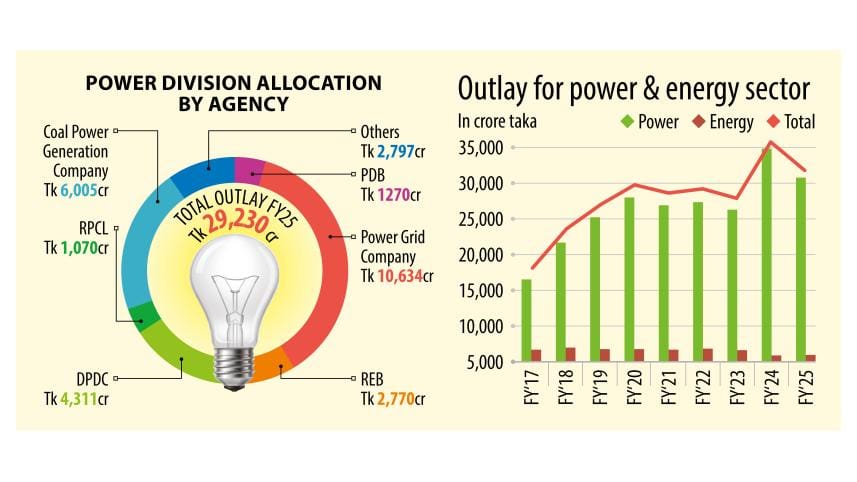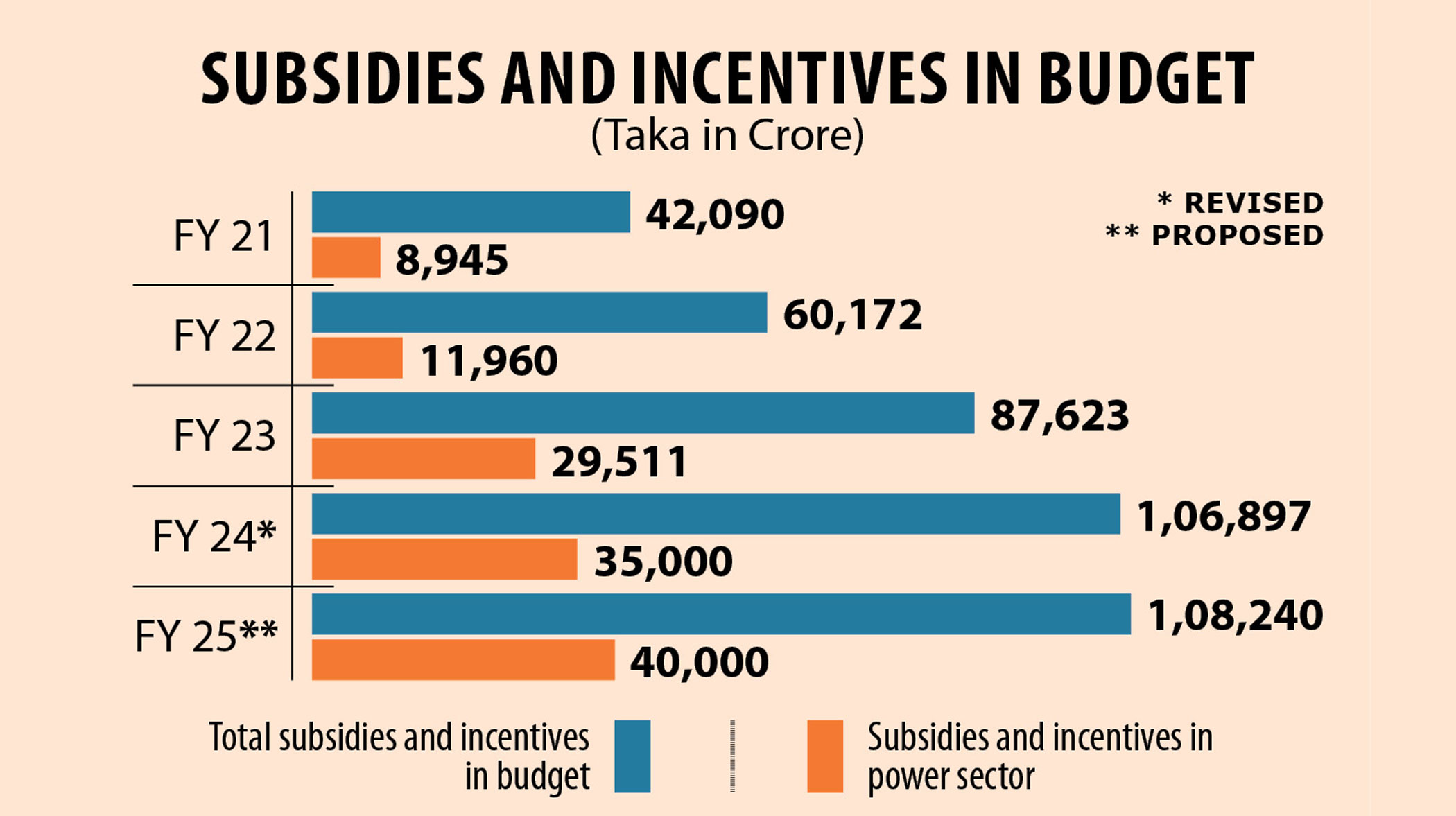Power Grid gets large sums as govt prioritises transmission, distribution

Around a third of the budgetary allocation set aside for the power division is going to the Power Grid Company of Bangladesh (PGCB) as the government plans to make the most of installed generation capacity by expanding grids and making some of the existing facilities smart.
The finance minister has set aside Tk 29,230 crore for the power division for 2024-25, down 13 percent year-on-year. PGCB will get Tk 10,634 crore.
Coal Power Generation Company of Bangladesh, which is implementing the Matarbari power plant in Cox's Bazar, received the second-highest allocation.
Centring the power plant project, PGCB is implementing several projects in Chattogram, upgrading grids. It has received Tk 1,500 crore to carry out the tasks.
The Barapukuria-Bogura-Kaliakair 400kv project has been given Tk 2,356 crore and the power evacuation facilities project Tk 646 crore.
Among the PGCB's schemes, the highest Tk 3,555 crore has been earmarked for the Power Network Strengthening project, which started in 2016.
In Bangladesh, the power generation capacity increased to 30,277 megawatts in 2023-24 from 4,942 MW in 2009, said Finance Minister Abul Hassan Mahmood Ali in his budget speech.
Currently, 27 plants with a combined capacity of 9,144 MWs are under construction. Most of them are in the private sector.
In the Mymensingh region, the power supply situation is worse than in other parts of the country. There is a gas-fired power plant there, but it doesn't get enough supply of the energy. A pipeline project, initiated to improve the supply of gas, has received Tk 1,070 crore from the power division's budget.
Bangladesh Power Development Board (BPDB) will finance two electricity plants, five distribution projects, and two pre-paid metre-related projects.
The Sustainable and Renewable Energy Development Authority (SREDA) has been given Tk 11 crore.
Bangladesh Rural Electrification Board's (REB) irrigation with solar power project has seen allocation doubling to Tk 330 crore. Most of the state-run enterprise's projects are related to distribution.
Companies under the power division also include Rural Power Companies of Bangladesh, and North-West Power Generation Company, which are executing some generation projects, including the Rupsha 800MW power plant.
Other distribution companies are executing projects either on pre-paid metre or upgradation.
Mohammad Hossain, director-general of the Power Cell, said the government has mainly prioritised transmission and distribution-linked projects in FY25.
"We have 100 percent people under our coverage. Now our priority is to provide a sustainable and reliable electricity supply. We want a smart grid network across the country."
About the reduction in the allocation, he said, "Owing to the volatile market situation globally, we sought a lower-than-usual budgetary allocation. However, we have got what we require."
The proposed increase of Tk 93 crore for the energy and mineral resources division in the budget is not enough for the explorations needed to discover domestic gas and other mineral resources, said experts.
Citing the volatile fuel market, they said the budget allocation predominantly focused on importing fuel to cover needs when sourcing primary energy like gas and coal from the domestic front was needed.
The allocation for the Ministry of Power, Energy and Mineral Resources declined 13 percent to Tk 30,317 crore in FY25.
Khondaker Golam Moazzem, research director at the Centre for Policy Dialogue, welcomed the government's focus on transmission and distribution instead of raising generation.
"Due to a lack of adequate transmission networks, there are many areas where disruption takes place in the supply system. It is common that power plants go into operation long after their construction due to a lack of infrastructure."
He also lauded the Tk 100 crore special allocation for renewable energy research and development activities.
The economist, however, added it was upsetting that the SREDA, which works to promote renewable energy, was given the lowest allocation. "It comes at a time when wind power installations should get attention."
"The government says it is focusing on renewables, but the budget allocation doesn't reflect it."
Moazzem added that there are organisations which receive funds for renewable research. "There should be an assessment to find out how these funds are spent."
Prof Mohammad Tamim, a former adviser to a caretaker government, said in the current context, it is clear that local gas exploration and extraction is more important than the import of high-cost LNG and other fuels. However, the allocation is miniscule for the energy division.
He added that as there is overcapacity in the power sector, there is no need to increase the budget for electricity generation.
"It is time to invest in the transmission system and the primary fuel supply chain. The government has prioritised the first one. However, the second one has been neglected."
Prof M Shamsul Alam, energy adviser of the Consumers Association of Bangladesh, said the huge gap in allocation between the two divisions reflects that the government is raising power generation capacity without securing the energy supply chain.




 For all latest news, follow The Daily Star's Google News channel.
For all latest news, follow The Daily Star's Google News channel. 
Comments